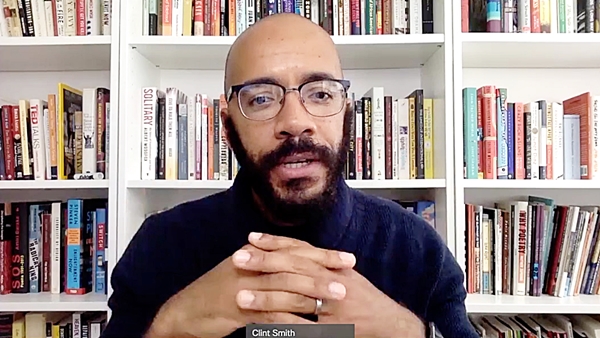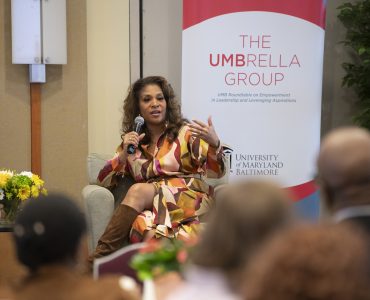Clint Smith, PhD, was born and raised in New Orleans in a mixed-race, mixed-income community where his circle of friends was diverse, so he didn’t understand when his father told him, “The implications for the decisions that you make might be very different for you than they are for your friends.”
Smith said he thought his father was just being a strict dad, and it wasn’t until later when 12-year-old Tamir Rice was fatally shot by a white police officer in Cleveland that he realized it was more than that. Rice, who was Black, had been holding a toy gun.
“I saw the most fatalistic manifestation of their fears,” said Smith, who was the featured guest for the University of Maryland, Baltimore (UMB) Diversity Advisory Council’s Virtual Speaker Series on Oct. 22.
Smith used his personal memories as a backdrop to his talk, “History Reconsidered,” in which he challenged viewers to examine the often-hidden realities not taught in our schools about the history of racism in the United States and how that history has shaped our lives today.
“I thought about all the conversations that have happened over the course of generations and how this conversation that Black parents have with their children is often an intergenerational conversation,” he said. “That my grandfather had a certain conversation with my father. My father had a certain conversation with me. That I will one day have a certain conversation with my son who is 3 years old.
“We walk through the park, the grocery store, and people say, ‘Oh your son is so cute, so adorable.’ And for me, I’m reminded that that will end much earlier for him than it will for his white counterparts,” Smith said. “I consider the difficult balancing act of what it means to communicate to a Black child the realities of the world while trying not to make them feel as if they have done something to deserve it.”
Smith is a teacher, award-winning writer, and Emerson Fellow at New America, a national think tank in Washington, D.C. His newest book, How the Word Is Passed, examines seven places in America built by enslaved people, from Monticello to Angola State Prison, and looks at how the legacy of racism is regarded and reflected in each.
During the introduction to the speaker series event, UMB President Bruce E. Jarrell, MD, FACS, said, “I think just as you cannot treat a disease without a diagnosis, you certainly cannot fully understand our current society without understanding the history that got us here. How did we get to this point?”
Smith read three of his poems, inspired by Rice, slave-owning U.S. presidents, and the New Deal. He lamented that the event could not be held in person and asked viewers to snap their fingers when they felt moved.
He discussed Thomas Jefferson and other presidents before reading his poem, “Letter to Five of the Presidents Who Owned Slaves.”
“Thomas Jefferson was a brilliant man, and he was also deeply racist,” Smith said. “He was someone who wrote one of the most important foundational aspirational documents in the history of the world, and he is also someone who enslaved over 600 people over the course of his lifetime.
“What that demands of us is not that we run from or pretend that this part of Jefferson doesn’t exist. What it demands of us is that we hold these complicated truths and these complicated realities together and understand these sort of entanglements and contradictions and lean into them.”
Smith pointed out that slavery is not the only thing that has shaped racism in American history and discussed the New Deal, which he was taught in school helped lift Americans out of the poverty of the Great Depression and created opportunity and wealth across the country. What he said he didn’t learn until much later was that the New Deal was built to be systemically racist and to keep Black people from accessing its benefits like housing mortgages, the G.I. bill, and Social Security.
“And then people want to act surprised generations later when there are disparate outcomes,” he said. “This is a microcosm of something that happens across American history in which public policy decisions are made on a federal, state, or municipal level and they have these impacts not only on the people of that moment, but they have impacts on those people’s children, they have impacts on those people’s children’s children.”
The talk ended with a round of questions from the audience. One viewer asked whether Smith believes that reparations should be made to African Americans.
“I absolutely believe there need to be reparations,” Smith said. “But part of what I think is important is not to think of reparations strictly in a material sense. I think what’s important is federal acknowledgment of what has been done to Black people because that acknowledgment on a societal level will shape what public policy looks like moving forward.”
He added that when he gives talks, people approach him later to say they hadn’t known certain details about history, such as the New Deal leaving out African Americans, and that the narrative can be shifted.
“These are the sorts of things that you should learn in your seventh-grade social studies class, that you shouldn’t need to go get a graduate degree at Harvard to know about,” Smith said.




